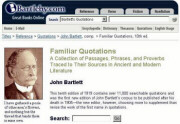|
Reference resources provide very specific kinds of
information. It is best to use them when you know exactly what information
you need. You should be able to decide which reference resource
to use, according to the question you need answered. For example:
- What does the word "conservation" mean?
You would use a dictionary to answer this.
- Who is Nyerere? You would need to use a biographical
reference because Nyerere is a person.
Advantages of reference websites
1. The information is in condensed form, which makes
it easy to find and read. Reference websites are very specific
information sources. Below are some examples.
Disadvantages of reference websites
1. Not all reference websites provide in-depth information. If that
is your requirement then you would look for websites dedicated
to that subject using a search engine such as Google.
For
example if you want to know the population of Mozambique you
would look in the CIA Factbook (a reference website). Should
you want to know information on Africa in general e.g. about
the National Parks of Africa you would use a site like Living
Africa (which you would
find through a search engine). |

|
2.
Some reference websites may not provide you with current information.
For this, you would use a current affairs website such as those
hosted by some newspapers,
such as Independent
OnLine  ,
and television
channels such as CNN ,
and television
channels such as CNN 
|

 
|
|


